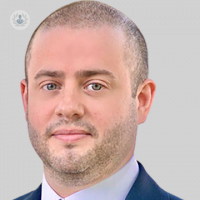Endoscopy: What conditions can it diagnose and treat?
Written in association with:Endoscopy is a medical procedure that can be used for diagnostic as well as therapeutic purposes.
Here, Dr James Evans, renowned consultant gastroenterologist, offers his expert insight into endoscopy and its different types.

What is endoscopy, and how is it used in medical diagnosis and treatment?
An endoscopy is a safe and reliable test to examine the inside of various parts of the body.
What are the different types of endoscopy procedures, and what conditions can they diagnose or treat?
There are different types of endoscopy, including:
- Gastroscopy: An examination of the oesophagus (gullet), stomach, and duodenum (the first part of the bowel beyond the stomach).
- Colonoscopy: An examination of the large bowel (colon) and the last part of the small bowel (terminal ileum).
Both procedures allow the doctor to examine for causes of a range of symptoms.
A gastroscopy helps to diagnose conditions like acid reflux, oesophagitis, hiatus hernia, gastric or duodenal ulcer disease, Barrett’s oesophagus, coeliac disease, as well as causes of anaemia, and less-common conditions including oesophageal cancer and stomach cancer.
A colonoscopy helps to investigate symptoms of diarrhoea, such as bleeding, and helps to diagnose conditions like inflammatory bowel disease (IBD) or polyps in the large bowel.
How should I prepare for an endoscopy procedure, such as fasting or medication adjustments?
For a gastroscopy, patients should fast (no food or drinks) for a minimum of four hours before the test. Patients may take their regular medications, but they should inform the doctor if they’re on blood-thinning medications.
For a colonoscopy, patients will need to drink some gentle laxatives and plenty of water the day before the test in order to prepare the bowel for careful inspection. This will then enable the doctor to detect polyps (small projections of tissue) which, if found, are easily and painlessly removed to prevent the development of bowel cancer.
How long does an endoscopy procedure typically last?
A gastroscopy is performed as a day-case procedure, under light sedation or local anaesthetic sprayed on the back of the throat. It takes less than 10 minutes to complete. During the gastroscopy, a long, thin, flexible tube with a camera is passed through the mouth into the stomach.
A colonoscopy is usually performed as a day-case procedure, under conscious sedation. It takes about 20-30 minutes to complete. During the colonoscopy, a long, thin, flexible tube with a camera is passed via the back passage and along the large intestine to examine the inside of the bowels. In some cases, it may be necessary to take a biopsy (small piece of tissue) for further investigation, which is done painlessly through the tube using tiny forceps.
What are the potential risks and complications associated with endoscopy?
The risks of having an endoscopy are very small. The two main complications to be aware of are bleeding and perforation. However, the risk of this occurring based on national figures in the UK is 1 in 5000 cases for a gastroscopy and roughly 1 in 2000 cases for a colonoscopy.
Are there any alternatives to endoscopy for diagnosing or treating certain medical conditions?
The alternative to a gastroscopy is a barium swallow test, where a drink of liquid that shows up on the X-ray is ingested to enable a rough outline of the view of the oesophagus. However, a barium swallow test isn’t usually necessary as most patients can easily tolerate a gastroscopy.
Alternatives to a colonoscopy are available for more frail patients. For example, a virtual colonoscopy can be offered, which is a type of CT scan. Just before the virtual colonoscopy, the radiographer will pass a tube into the back passage and pump in some air and gas (carbon dioxide), which will expand the bowels and help to provide a clearer picture. Patients will have two CT scans – one lying on the back and one lying on the front. Again, there is a small risk of perforation with this text, with national figures in the UK of roughly 1 in 5000 cases. Additionally, patients will need to follow a special diet for a few days after this procedure.
Dr James Evans is highly skilled in performing diagnostic and therapeutic endoscopy. If you require endoscopy and you would like to consult your options with an expert, don’t hesitate to reach out to Dr Evans via his Top Doctors profile today.


